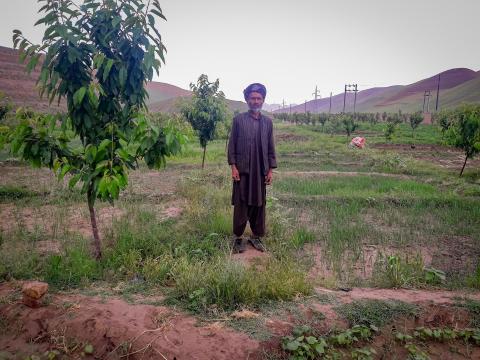Cultivating land provides access to diversified food

“My name is Abdul Qadir, 50, and I live in Qalai Naw district of Badghis Province. I am a farmer having 22 acres of land and I grow almonds, peaches, pistachio, and asafetida. My wife and elder son help with all the chores related to cultivation. As we rely on the rain-fed agriculture, it is difficult to diversify and sustain our farming activities. As a result, we were not able to cultivate crops that require a lot of water. Irrigating by hand was exhausting,'' says Abdul Qadir, a farmer with experience.
Due to the worsening economic situation, dwindling natural resources and erratic rainfall patterns his family was not able to produce as much as they would expect. Having heard about World Vision’s interventions related to improving agricultural productivity Abdul Qadir approached the organisation for assistance.
''A joint team from World Vision and Department of Agriculture visited my piece of land to assess what possible activities I could do. They offered to provide me with assistance to establish pistachio garden on the hills that surround my land. This idea was very much welcomed by my family. I was given 400 pistachio saplings, which is enough to cover about one hectare of land. In addition to that, I was provided with a drip irrigation system to irrigate my saplings. Drip irrigation can decrease water consumption by about 75 to 80 percent. It also has little water loss since it doesn't evaporate or runoff and allows all nutrients to get to the roots. By planting these trees I have contributed to land rehabilitation and made the area green that used to be barren and lifeless. Now thanks to World Vision's assistance we managed to restore our land and keep our air clean and fresh,” explains Abdul Qadir.
Tree planting activities in arid and barren areas, such as Badghis, is a key to revitalise and rehabilite degraded places. During the summer season dust accumulates in the city due to the wind, utterly polluting the air and increasing the temperature. Trees help absorb smells and pollutant gases and filter particulates out of the air by trapping them on their leaves and bark.

The support provided to Abdul Qadir is through an Australian Aid funded project “Australia Afghanistan Community Resilience Scheme”.
In this project World Vision Afghanistan has reached out to more than 24,000 households in Badghis province with the main aim to increase livelihood opportunities, improve community cohesion and social inclusiveness.
The project works closely with Department of Agriculture to ensure the community ownership, sustainability and improve the management of the natural resources. World Vision has distributed improved seeds and fruit saplings to 1,415 farmers (1,194 men and 221 women). Also training was conducted on improved agricultural practices.
Planting trees helped families to have access to nutritious food as well as being able to raise income to meet the needs of children. It also creates a safer environment for children preserving natural resources for their future use.